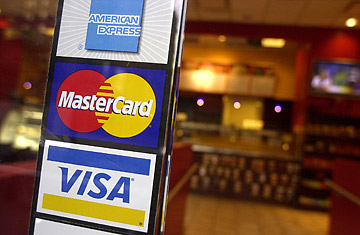
Americans have a long, sordid history with borrowed money. In Collateral Damaged: The Marketing of Consumer Debt to America, Charles Geisst, a professor of finance at Manhattan College, takes us through the centuries to explain how we wound up at our most recent — and spectacular — credit bubble. TIME's Barbara Kiviat spoke with him.
You write that one of the major myths about American society is that we used to be prudent with our money and only recently did we go astray. What's the real history?
Americans are speculative people. During and after the Civil War, for instance, there was a lot of stock market and commodities speculation — people trying to make a quick buck. But it was only when financial institutions picked up on that and provided the methods whereby you could buy now and pay later — that very simple concept — that things started to change structurally. Now Americans are more highly leveraged than they were in the past.
Which makes our most recent downturn worse?
Yes, absolutely. We're out of proportion with our amount of personal debt. A good number of people are in debt to the point where they may not ever be able to pay their way out.
Why didn't lenders better capitalize on our speculative bent sooner?
Our banking system was never national. In fact, it wasn't even retail in the 19th or early 20th century. The banks that were capable of doing the most lending to individuals didn't actually do it. We had to wait until Bank of America, for instance, got into business and a lot of the companies like Household Finance that started making consumer loans for this thing to actually warm up.
So going forward, how do we strike the right balance between the "democratization of credit" and the overextension of debt?
We have to go back to the notion of credit basics. In other words, to buy a house, you can't borrow more than, let's say, 2½ times your gross salary. We know the financial institutions are retrenching themselves right now. The question is, Has the consuming public learned anything from this? That's the more difficult issue.
How do you think the new regulations for credit-card companies will change things?
Well, they're going to tighten up some of the shoddy practices the credit-card companies have pulled off in the past. They seem to be taking notice of the GAO's periodic reports about the credit-card companies' practices — you know, misleading statements, using different font types, billing practices, hidden fees. It's going to address most of those issues. My problem with it is it still doesn't address the matter of interest rates. There's got to be a cap, as far as I'm concerned.
You actually assign a lot of blame for our recent troubles on a lack of interest-rate caps — that is, on the absence of strict usury laws. Why?
Almost every state had usury laws in the 1920s, and they were circumvented one by one. Prohibitions against excessive interest started to disappear [South Dakota, for instance, loosened its laws in 1980], and once they did, the credit-card companies recognized a wonderful opportunity. They could charge as much as the market would bear, claiming that they had to charge more for bad credit risks. You can argue that's the democratization of credit, but it's in the interest of credit-card companies to keep people under the yoke. We've just swapped loan sharks for legitimate loan sharks.
So maybe there are some people who just shouldn't have access to credit?
I think everyone should have access to credit in a very strict proportion to their income — not a future projection of their income, which is what we've been doing. It's been, "I'm now making $50,000, but in a few years I'll be making $150,000, so no big deal, let's go buy an expensive house now." This whole business of giving more credit than a person can service is not only foolish, but if you tried to do that 200 or 300 years ago, it would have been considered immoral as well. We don't think that way anymore, but essentially it is, because that person is going to be in debt forever.
You talk about the need for a financial-products safety commission. What do you think of the proposal the Obama Administration has put out there?
In the outline form we've seen so far, it looks like a good idea. But as I say in the book, if the thing is created, it's going to be barraged by new financial products from up above on Wall Street. They won't know what hit them. So I think unless there is some sort of regulatory body that is going to play chess with Wall Street, a complimentary body that filters this stuff on the wholesale level before it becomes the consumer stuff, whoever is on that consumer-safety commission is going to get completely swamped.
A lot of your book is about the history of borrowing money. Any favorite episodes?
Well, it's been a long road. During the Roman Empire, the first anti-usury law — and I think this says it all — was found in the Council of Nicea in the 4th century. It states that no clergyman could practice usury, so you can get a pretty good idea of what was going on then — lending to the flock. The odd part is, the Council of Nicea was also the council that confirmed the concept of the Trinity. Those are probably two of the most unlikely pieces of legislation you could find in the same piece of canon law.
